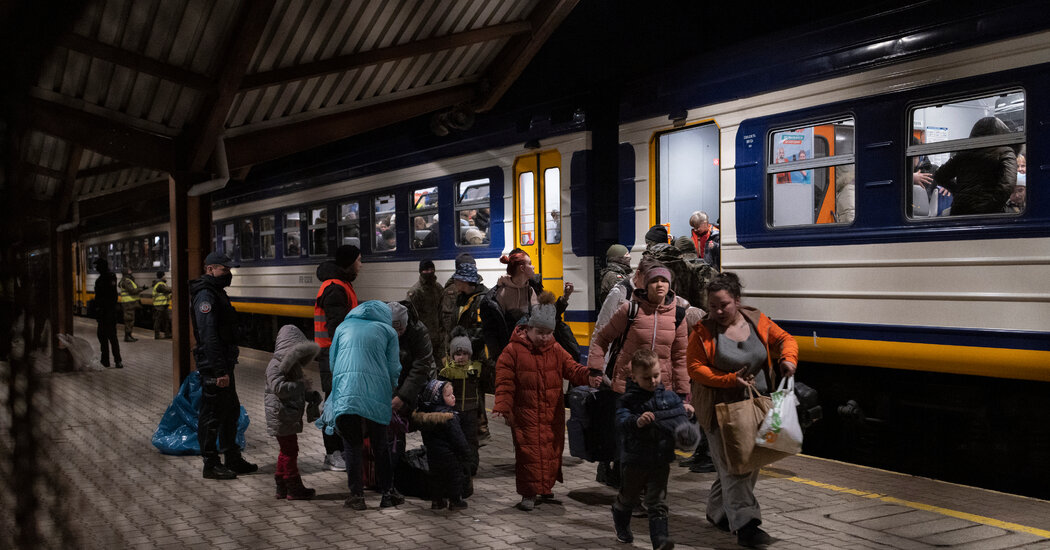
LUBLIN, Poland — On a recent morning, I sat in the sun-filled dining room of a tidy house in eastern Poland, across from one of the most generous men I’ve ever met.
He was a Polish apple farmer who took in eight Ukrainian refugees, all complete strangers, and gave them a place to stay, cooked them meals, brought them armloads of fresh bread every morning and has been trying to find them jobs.
But when it came to talking about World War II, this is what he said: “The real disaster started when the Russians invaded. The Russians were worse than the Germans.”
“The Germans,” he said, “did not hurt ordinary people.”
My first reaction fell somewhere between disappointment and silent outrage: How could this farmer be so kind and so blind? How could he say the Germans didn’t hurt “ordinary people” when they murdered millions of Jews right here in Poland? The biggest death camps were in Poland, and the more I thought about it, the more I was shocked by what the farmer said. I don’t want to include his name, because my point is not to shame him over an offhand comment, a few words in an hourlong interview, but to share my intense reaction to it.
But then I realized he and I were actually engaging in a similar type of thinking.
He couldn’t stop obsessing about Russia, which occupied Poland during World War II and controlled it for many decades afterward, and is now dropping bombs just a few miles from the border. And I couldn’t stop thinking about the Holocaust. Neither of us had lived through all that history ourselves — the trauma was handed down to us from our families — but both of us were trapped in the past.
I think that’s the hardest aspect of covering the war in Ukraine and its spillover effect across the region: how to integrate the past with the present.
For Jews like me, whose ancestors come from Eastern Europe, we feel especially yanked back and forth because the most searing event in our collective histories, the Holocaust, happened exactly where the news is unfolding today.
Jews were wiped out during World War II in the same places as in today’s headlines: Lviv, Warsaw, Kyiv, Kharkiv, Odesa, the list goes on. Countless Ukrainians and Poles helped the Nazis; some did take brave steps to save Jews. But even after the war ended and the Nazis left, Polish mobs killed Jews. Those are facts.
Yet now Ukraine is rallying around a Jewish president. The nation’s spirited resistance against a powerful invader has inspired people around the world. The Poles have also done something truly remarkable: absorbing more than two million refugees in less than two months, and they haven’t stuck them in grim camps but instead have taken them into their own homes. Those are facts, too.
How should we reconcile them?
I asked the writer Daniel Mendelsohn, author of a profoundly moving book called “The Lost: A Search for Six of Six Million,” about his quest to discover what happened to relatives who disappeared during the Holocaust from Ukraine, a place where the Nazis found many eager collaborators and where many Jews were massacred in pogroms during czarist times.
“The feeling you’re talking about is one I know well,” he said. “When I was growing up the refrain was: The Germans were bad, the Poles were worse, and the Ukrainians were the worst. And now look. Whoever thought we’d be rooting for the Ukrainians?”
What’s important, he said, is allowing yourself to update deeply felt beliefs.
“You can’t spend your life looking at the past,” he said. “Times change. Everything changes. The earth spins on its axis. And hopefully a new world emerges.”
I don’t doubt the apple farmer is a good person, but the ghosts he stirred in that room trailed after me.
When I toured a museum in Przemysl, a beautiful little city with a blood-soaked history right on the border of Poland and Ukraine, I found myself unable to pull my eyes from a photograph of the Jewish Ghetto there: two Nazi soldiers pinning an old Jewish man against a wall and cutting off his beard, a small but deeply humiliating act.
I’d been steeped in the broader story my entire life. I learned it from my family, in Hebrew school, at temple. Remembrance of the Holocaust is part of our culture. But this was my first time in Poland, and it’s something entirely different to stand in the same place where all these innocent people were killed and allow yourself to really think about it. It made me lightheaded and nauseated.
The director of the museum, giving me a tour, could tell I was upset.
“This town used to be a third Jewish,” he said.
How many are left?
“Six families,” he said.
I left that museum almost broken, overwhelmed with grief for people I didn’t know. The feeling was paralyzing, big and shapeless.
For the rest of my time in Poland, I traveled through a landscape filled with vivid memories that belonged to others. I passed snowbound villages with frozen lakes and little wooden houses that thrust me back into the pages of one of the most unforgettable books I’ve ever read, “The Painted Bird” by Jerzy Kosinski.
As I stood in the bitter cold outside Przemysl’s train station, watching crowds of refugees drift off a train from Lviv, exhausted, lost and hungry, I couldn’t stop thinking of “Everything Is Illuminated,” an exquisitely written novel whose plot begins at Lviv’s train station.
I asked its author, Jonathan Safran Foer, who, like Mr. Mendelsohn, wrote about going back to Ukraine in a quest for his roots: What do you feel about this whole crisis?
“I feel guilt,” he said, explaining that while his grandmother’s family was murdered in Ukraine, his grandfather was sheltered in secret, at great risk, by a Ukrainian family.
Russia-Ukraine War: Key Developments
A blow to Russian forces. The flagship of Russia’s Black Sea fleet suffered catastrophic damage that forced the crew to abandon it. Russia said that a fire had caused the damage, though Ukraine claimed to have struck the vessel with missiles. The ship subsequently sank while being towed to port.
“I wouldn’t be here if it weren’t for the bravery and goodness of that Ukrainian family,” Mr. Foer said.
And so he asks himself, without a good answer: “Am I not doing for them what they did for me?”
Then he added, quietly: “If I’d said to my grandmother that the president of Ukraine is Jewish, it’s hard to imagine anything that would have been more surprising to her.”
In so many dimensions of this war, the past infuses the present. President Vladimir V. Putin says he invaded Ukraine to “de-Nazify” it, which is false, but during World War II many Ukrainian nationalists did back the Nazis.
Some of Russia’s biggest oligarchs are Jews who have helped both Israel and Mr. Putin. Israel itself is trying to maintain a tenuous balance between sympathy for Ukrainians and its security concerns in Syria, whose government Russia props up.
It’s a lot to get one’s head around. After I sent a Polish carpenter friend, Marek Sawicki, a message from Przemysl, telling him how charmed I had been by the culture, the food and the overwhelming hospitality extended toward Ukrainian refugees, he wrote back: “Even I am surprised. There was bad blood between Poles and Ukrainians for centuries.”
Perhaps Poland is looking for redemption, he implied.
“After the fall of communism,” he said, “we learnt that we were not just heroes during the Second World War.”
My great-grandfather fled pogroms in Ukraine well before that, in 1914, and built a life selling fur coats in Atlantic City. He never looked back.
I see the value in that, but it’s a hard line to walk, cognitively and emotionally.
We shouldn’t forget what happened and, for some of us, even distantly connected to the events of the past, we simply can’t.
But the Ukraine of today and the Poland of today are not the Ukraine or Poland of the Holocaust.
And perhaps that’s one of the greatest lessons of this awful war. Countries are living things that grow and change. They are shaped by their past but not chained to it, just like us.




